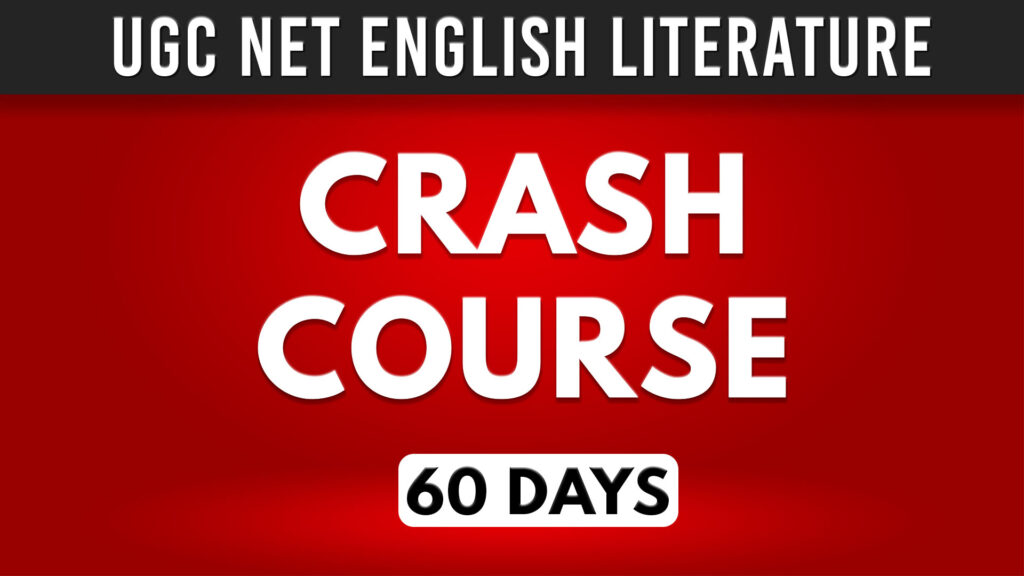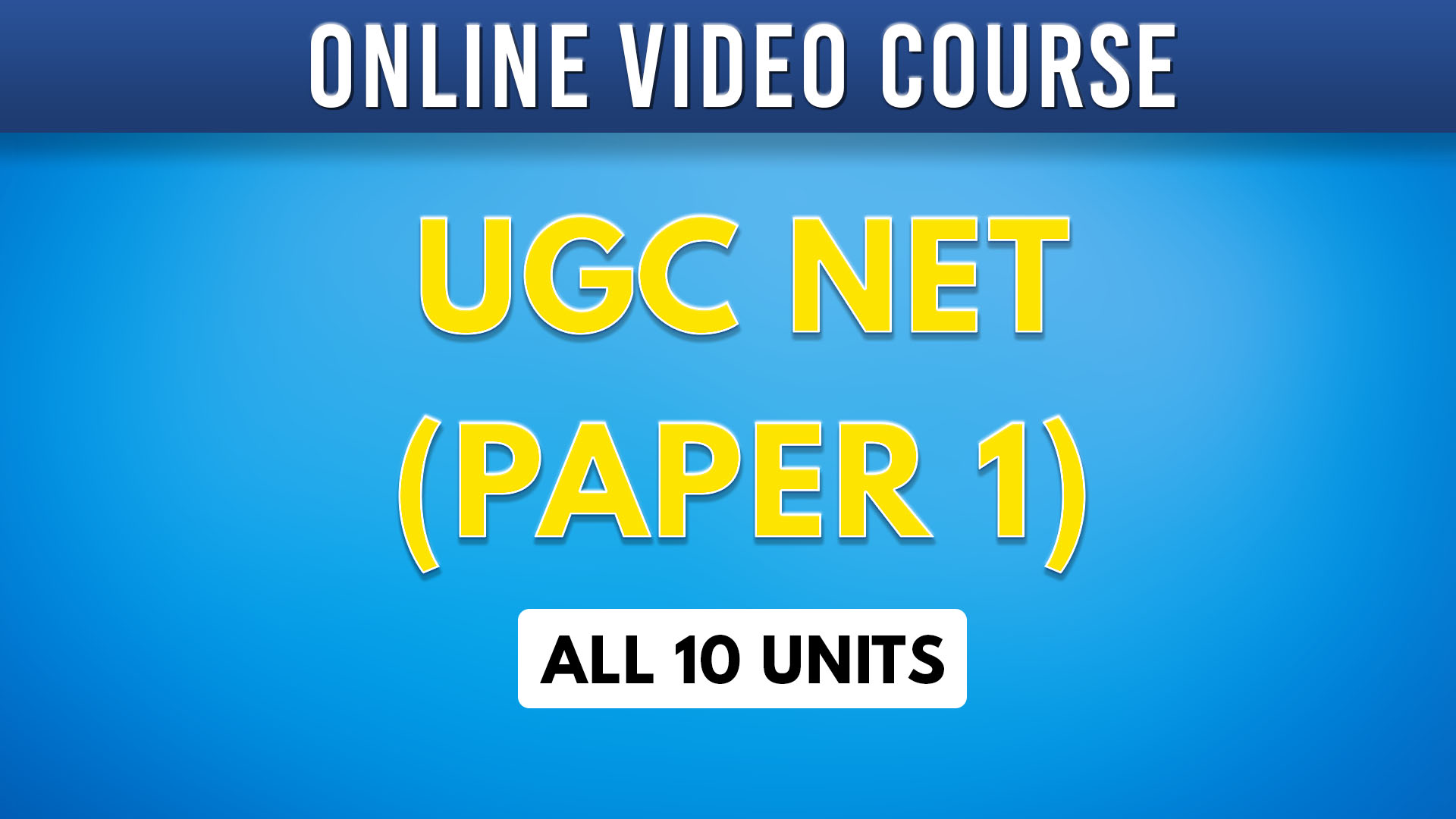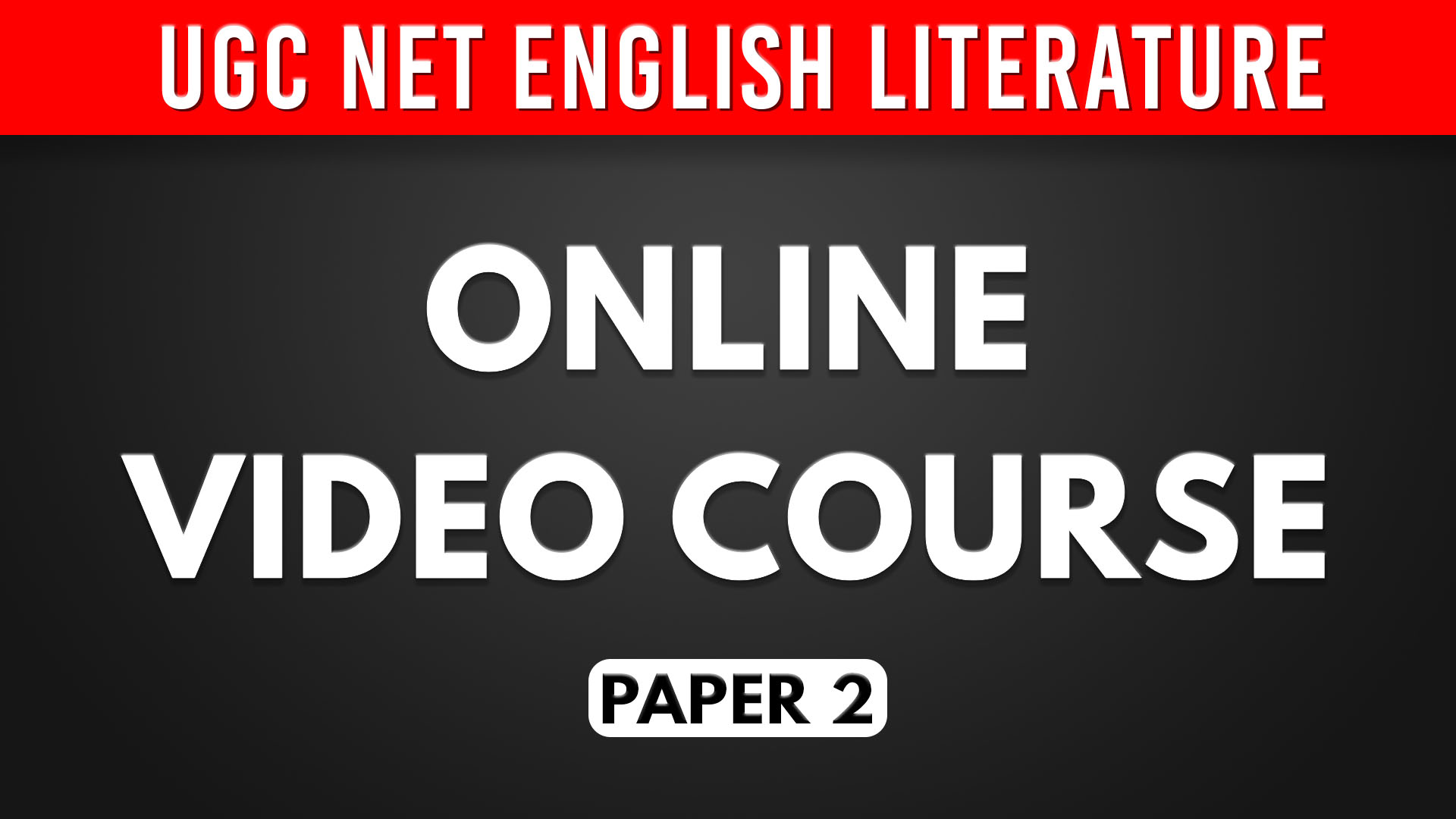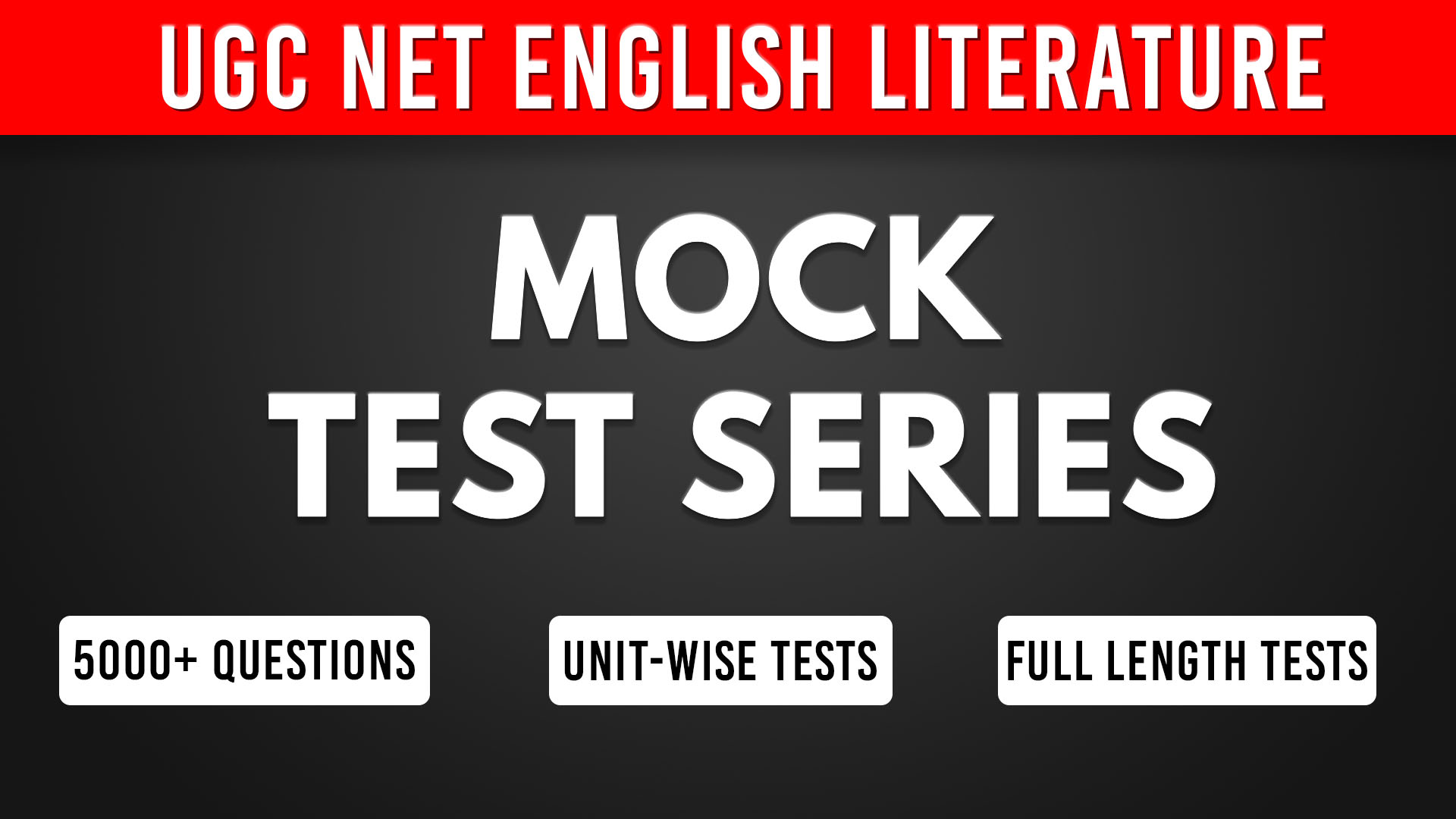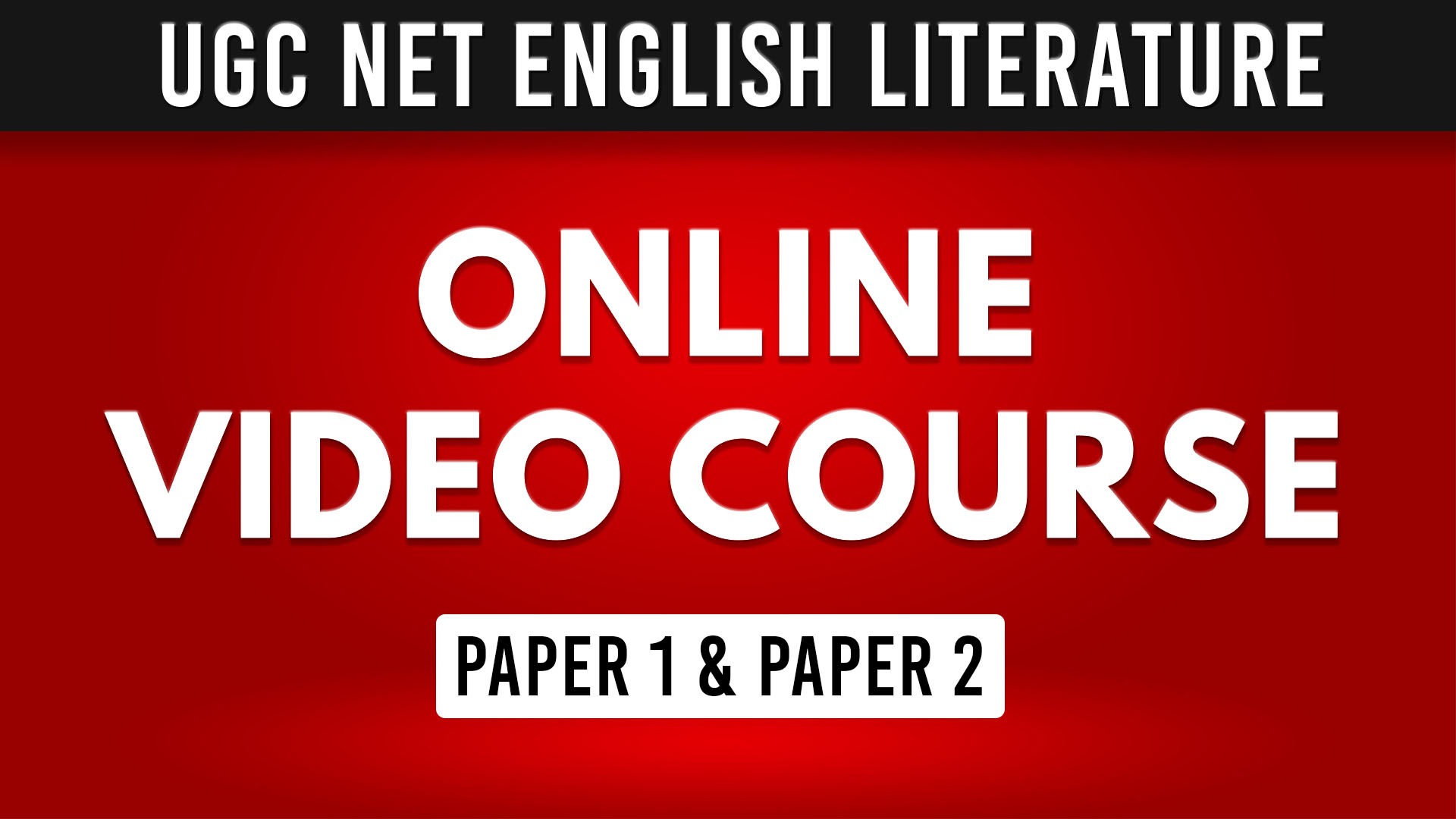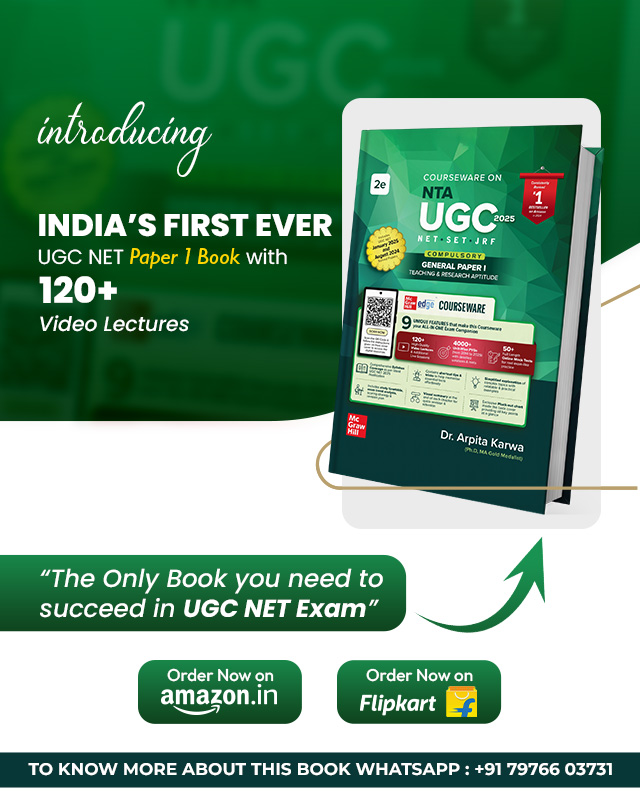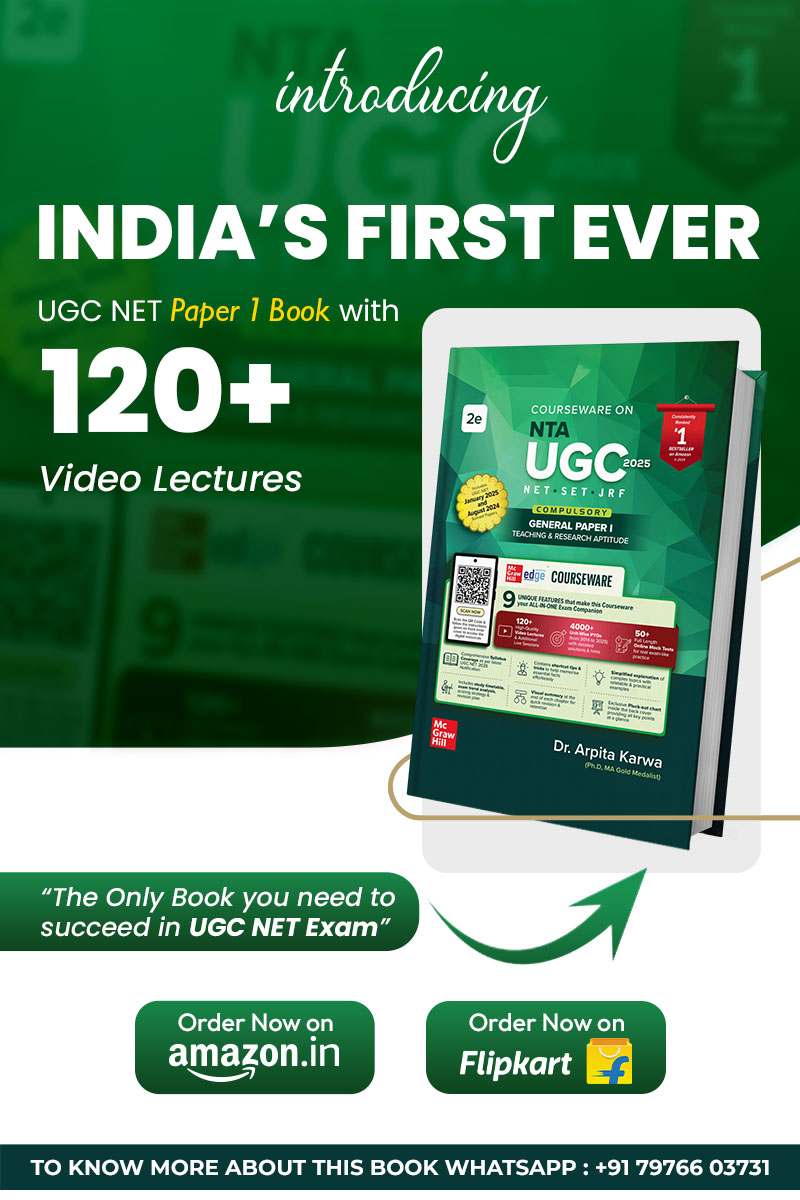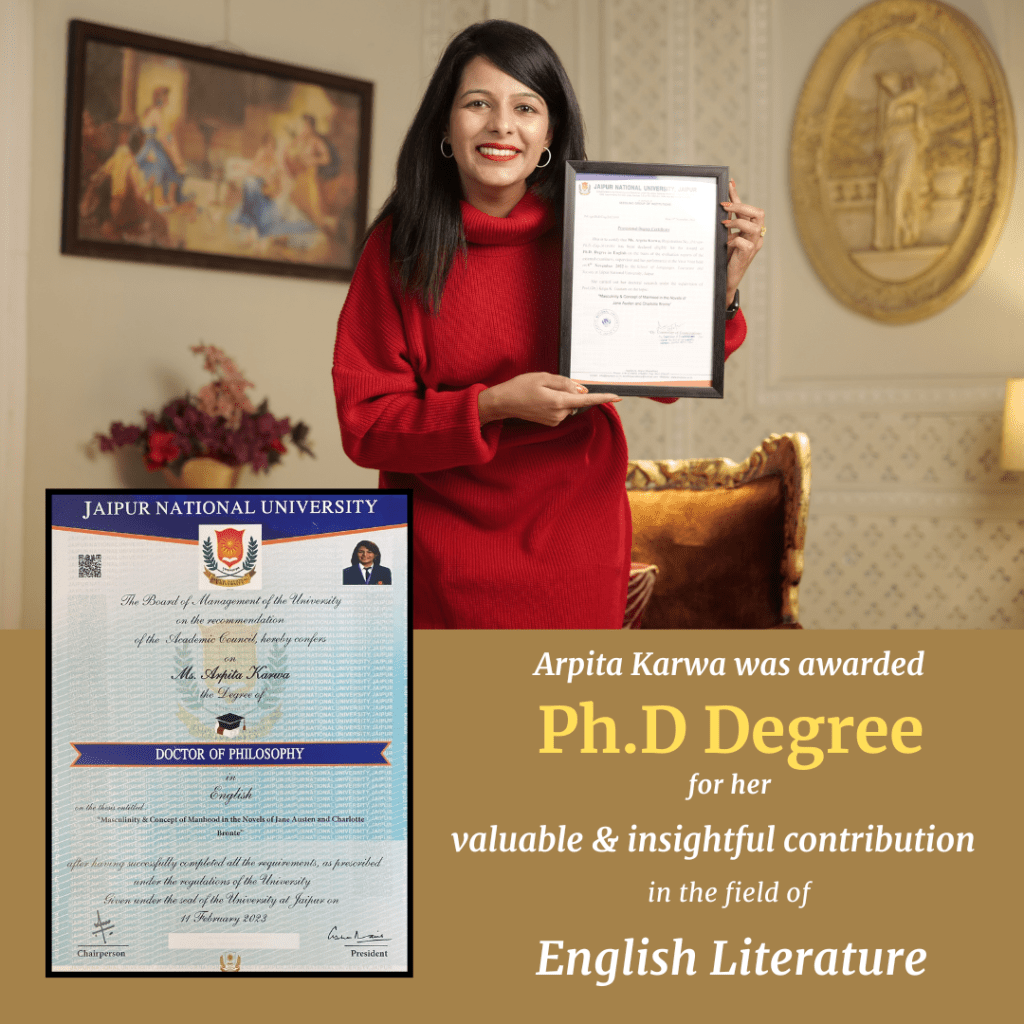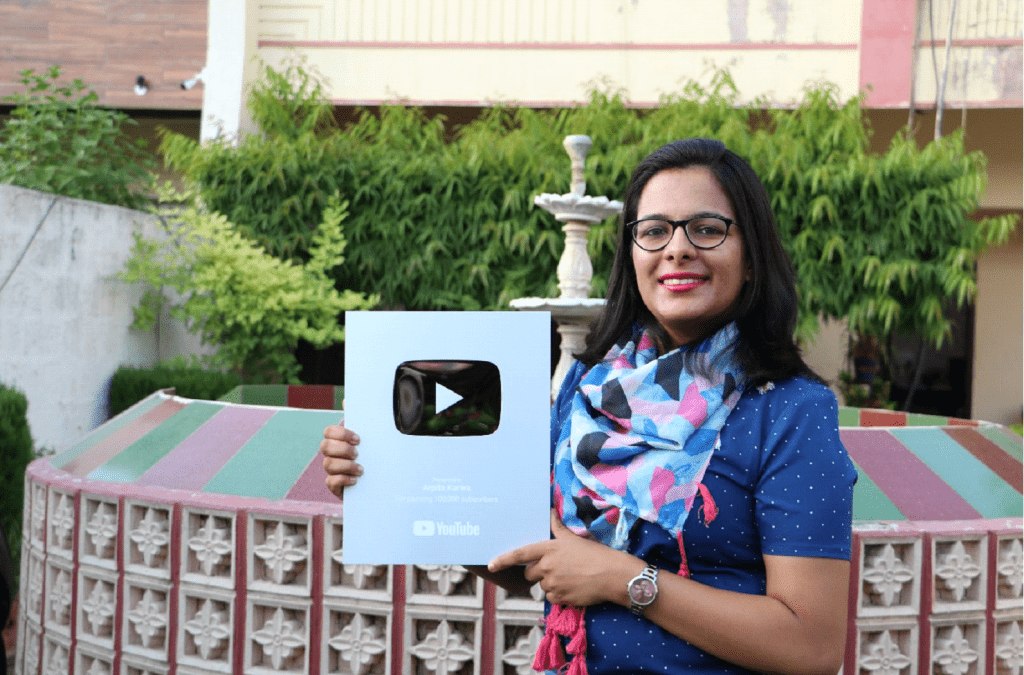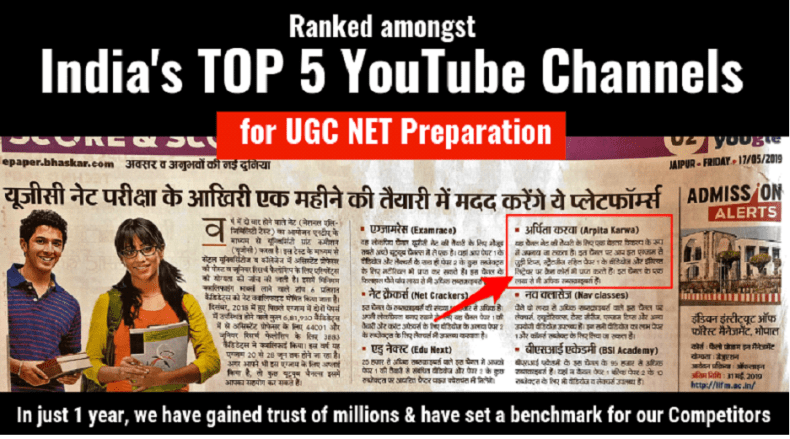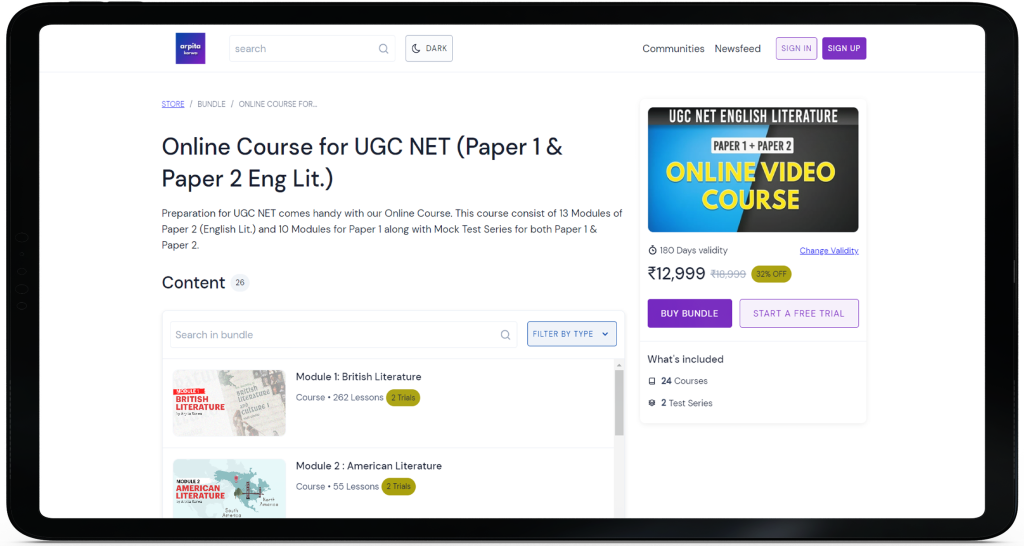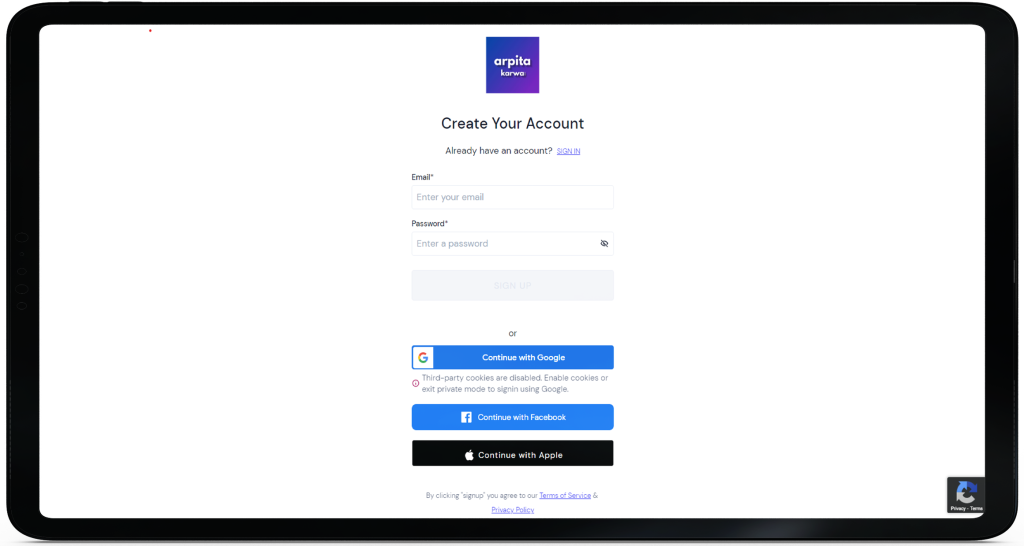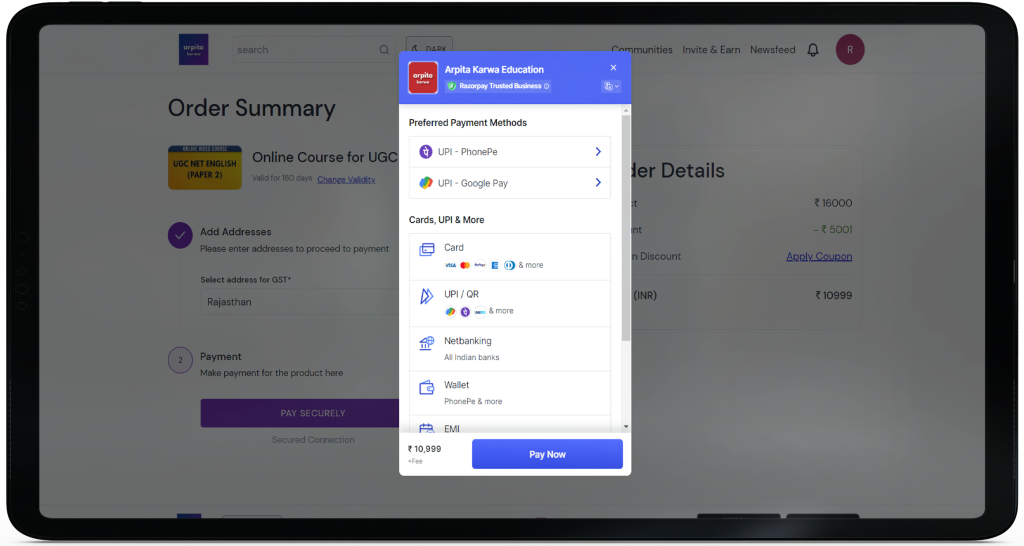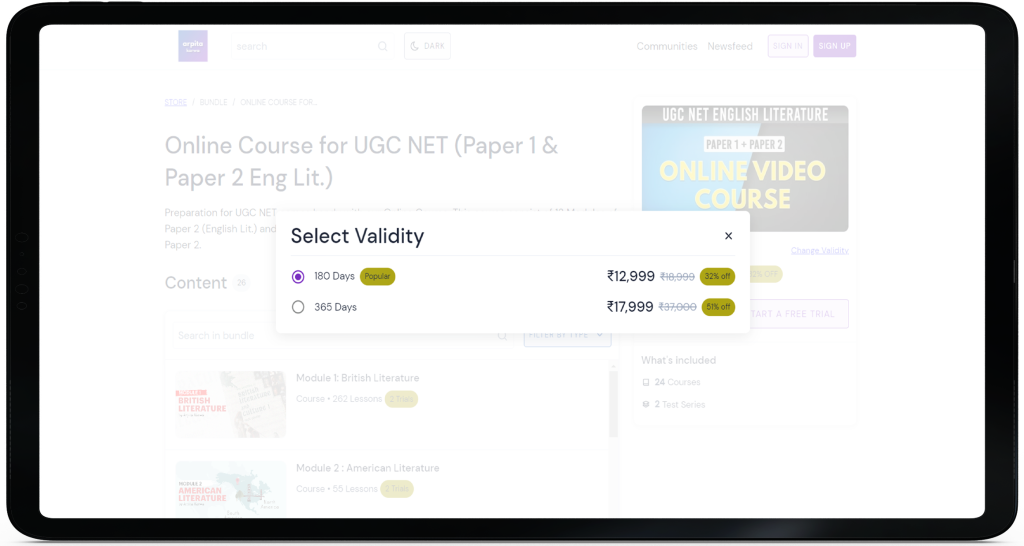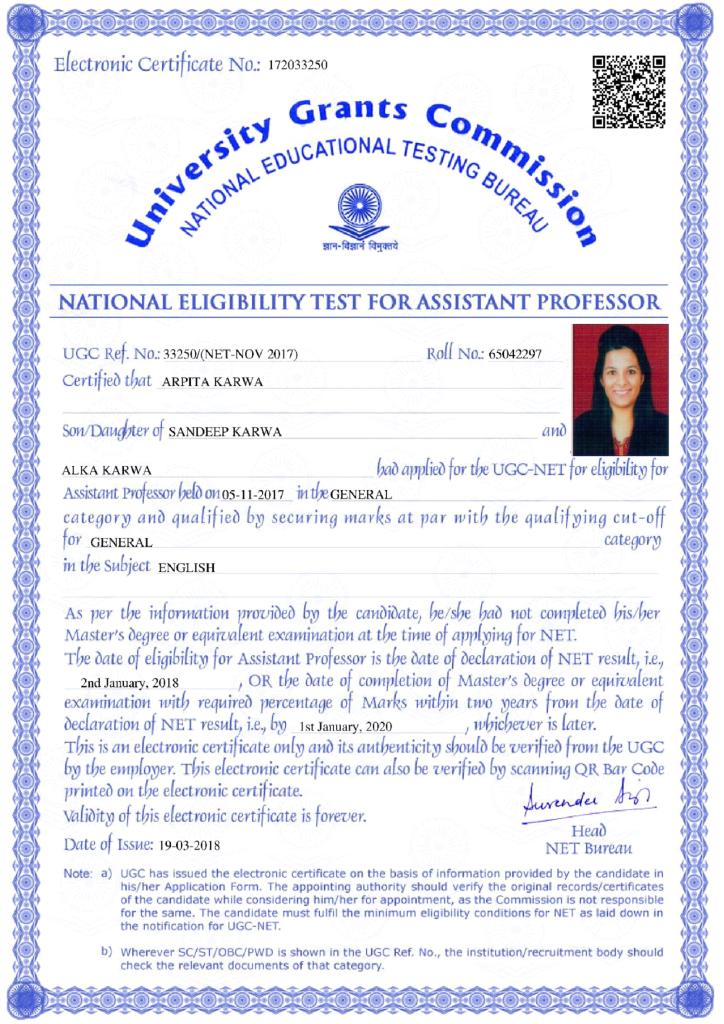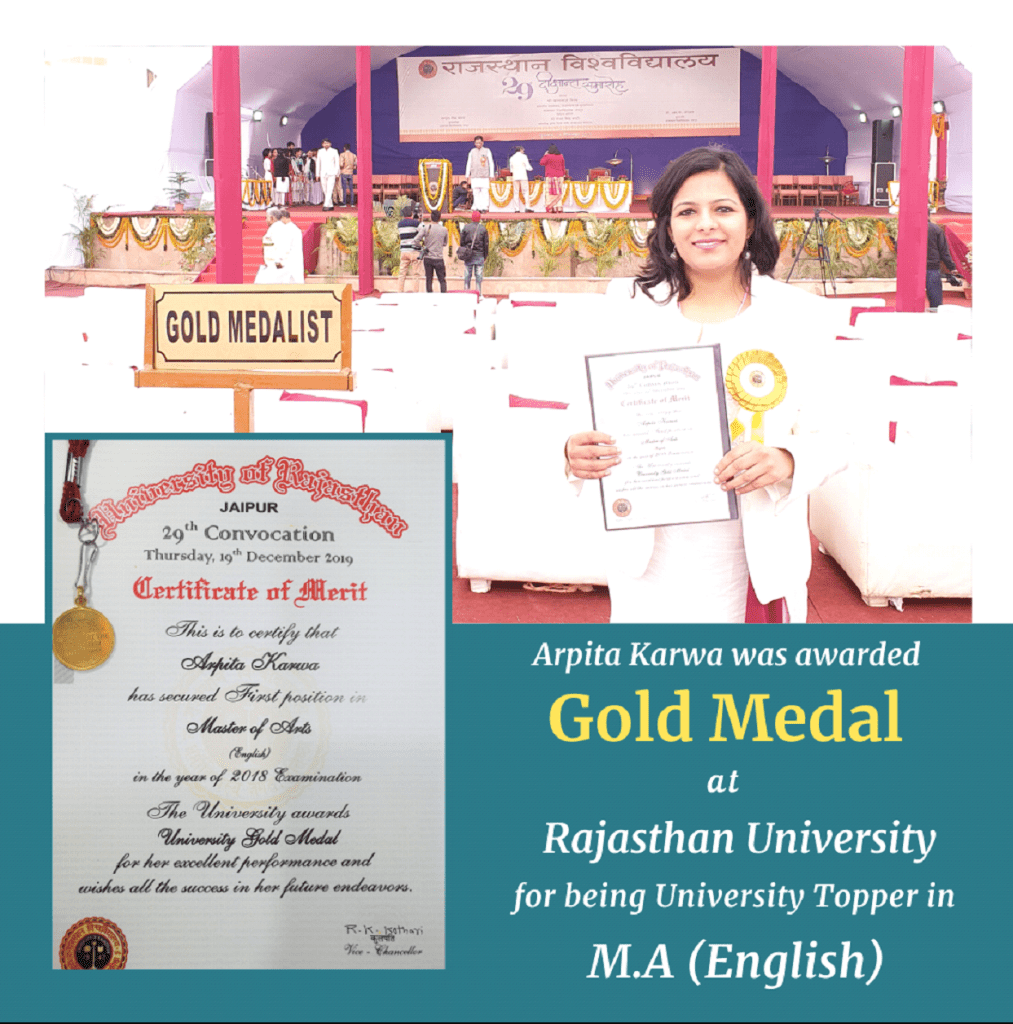UGC NET Paper 2 (English) Crash Course
November 12, 2022 2024-05-10 13:35UGC NET Paper 2 (English) Crash Course
UGC NET Paper 1 & 2 (English) Crash Course
Make UGC NET English a piece of cake with our 2 months crash course for UGC NET English Literature. Our course, designed and developed by Dr. Arpita Karwa, includes Animated Video Lectures, PDF notes, Question bank, and Previous Year Paper Analysis of UGC NET Paper 2 English. We are committed to guiding our students to success in UGC NET English which is undoubtedly one of the toughest exams in the country. What are you waiting for? Join our course today itself!
1100 +
Students Enrolled
4.8
Average Rating
220
Hours of Video Lectures
230
PDFs + Study Material
3000+
Mock Test Questions
English
Language of Instruction
1100 +
Students Enrolled
4.8
Average Rating
220
Hours of Video Lectures
230
PDFs + Study Material
3000+
Mock Test Questions
English
Language of Instruction
Demo Material
Video Lectures
PDFs
Types of Variable
Unit 02 : Research Aptitude
Types of Network
Unit 07 : Information & Computer Technology
Institutions of Education in Ancient India & Decline of Ancient Education
Module 09 : Higher Education
Features of This Course
Best quality video lectures
360 Degree Syllabus Coverage
High-quality PDFs & revision notes
Mock Tests series as per latest exam pattern
Course Description
The 2 Months Crash Course for UGC NET English Literature is designed for all the UGC NET English aspirants out there. This is the best online crash course for UGC NET in English and guarantees to make you thorough with all the important topics in UGC NET English syllabus within a time span of just 2 months. Our course is developed by Dr. Arpita Karwa, who is currently the most watched followed person in India for UGC NET English content. From Animated Video Lectures to PDF notes to Detailed Analysis of Previous Year Question Papers, our course has it all. We are the first and only online coaching platform in the country to provide Animated Video Lectures to students. The Animated lectures are delivered by Arpita Karwa and it gives access to topic wise video lessons with rich animations with exclusive focus on important topics like Literary Theory and Criticism, British Literature, Poetry, Drama, Fiction, Non Fiction, World Literature, Dalit, Indian, Diasporic Literature. Our lectures are designed according to the latest UGC NET English Syllabus and offer thorough understanding of even the most difficult areas in the syllabus. Our PDF notes provide you with clear and concise study material for the UGC NET English exam. The question bank and analysis of previous year question papers, which are also a part of the course, enables students to understand and familiarize with the types of questions asked and prepare accordingly. Join our course today and qualify UGC NET in English in your first attempt itself! Enroll Now
Pricing

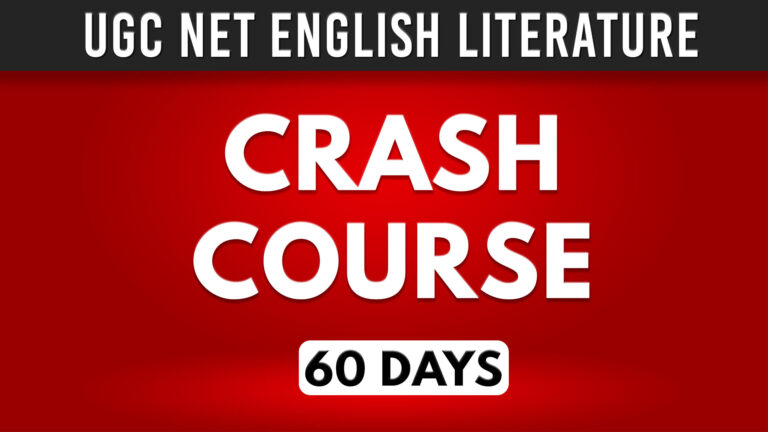
UGC NET Paper 1 & 2 (English) Crash Course - Everything You Need for Your Exam Preparation
Course Syllabus
- Module 01 – Teaching Aptitude
- Module 02 – Research Aptitude
- Module 03 – Communication
- Module 04 – Logical Reasoning
- Module 05 – Mathematical Aptitude
- Module 06 – Data Interpretation
- Module 07 – Information & Communication Technology
- Module 08 – People & Environment
- Module 09 – Higher Education
- Module 10 – Reading Comprehension
- Lesson 01 - Introduction
- Lesson 02 - Objectives of Teaching
- Lesson 03 - Nature & Characteristics of Teaching
- Lesson 04 - Characteristics Of Good Teacher (Part 1)
- Lesson 05 - Characteristics Of Good Teacher (Part 2)
- Lesson 06 - Factors Affecting Effectiveness of Teaching
- Lesson 07 - Levels of Teaching
- Lesson 08 - What is Learning?
- Lesson 09 - Domains of Learning
- Lesson 10 - Learner's Characteristics
- Lesson 11 - Classroom Communication
- Lesson 12 - Teaching Process
- Lesson 13 - Methods of Teaching
- Lesson 14 - E-Learning Facilities
- Lesson 15 - Teaching Aids
- Lesson 16 - Evaluation System
- Lesson 17 - New Modes of Learning
- Lesson 18 - Learning Disorders
- Lesson 19 - Teacher’s Role in Higher Education School
- Lesson 20 - Syllabus vs Curriculum
- Lesson 01 - Introduction
- Lesson 02 - Objectives & Characteristics of Research
- Lesson 03 - Types of Research (Part 1)
- Lesson 04 - Types of Research (Part 2)
- Lesson 05 - Types of Research (Part 3)
- Lesson 06 - Steps in Research Process
- Lesson 07 - Objectives & Research Design
- Lesson 08 - Variables
- Lesson 09 - Types of Variables
- Lesson 10 - Hypothesis
- Lesson 11 - Sampling
- Lesson 12 - Probability Sampling
- Lesson 13 - Non Probability Sampling
- Lesson 14 - Tools of Data Collection
- Lesson 15 - Data Analysis & Representation
- Lesson 16 - Hypothesis Testing
- Lesson 17 - Seminars, Conferences , Workshop & Symposiums
- Lesson 18 - Thesis Writing Format
- Lesson 19 - Citation
- Lesson 20 - Research Ethics
- Lesson 01 - Introduction
- Lesson 02 - Process of Communication (Part 1)
- Lesson 03 - Process of Communication (Part 2)
- Lesson 04 - Characteristics of Communication
- Lesson 05 - Types of Communication (Part 1)
- Lesson 06 - Types of Communication (Part 2)
- Lesson 07 - Types of Communication (Part 3)
- Lesson 08 - Barriers to Communication (Part 1)
- Lesson 09 - Barriers to Communication (Part 2)
- Lesson 10 - Effective Communication
- Lesson 11 - Classroom Communication (Part 1)
- Lesson 12 - Classroom Communication (Part 2)
- Lesson 13 - Mass Communication
- Lesson 14 - Types of Mass Communication: Films & Television
- Lesson 15 - Types of Mass Communication: Radio
- Lesson 16 - Types of Mass Communication: Press & Print Media
- Lesson 17 - Traditional Media & New Media
- Lesson 18 - Commonly Asked Definitions
- Lesson 19 - Commonly Asked Terminologies
- Lesson 20 - Important Concepts Related to Communication
- Lesson 01 - Introduction
- Lesson 02 - Meaning of an Argument
- Lesson 03 - Types of Argument (1)
- Lesson 04 - Conditions (1)
- Lesson 05 - Conditions (2)
- Lesson 06 - Questions of Arguments
- Lesson 07 - Types of Arguments (2)
- Lesson 08 - Types of Arguments (3)
- Lesson 09 - Syllogism, The Logical Way (1)
- Lesson 10 - Syllogism, The Logical Way (2)
- Lesson 11 - Syllogism, The Short Trick
- Lesson 12 - The History of LOGIC
- Lesson 13 - The Squares of Opposition
- Lesson 14 - PYPQ
- Lesson 01 - Introduction
- Lesson 02 - Series (Part 1: Number Series)
- Lesson 03 - Series (Part 2: Number Series)
- Lesson 04 - Series (Part 3.1 : Number Series)
- Lesson 05 - Series (Part 3.2 : Letter Series)
- Lesson 06 - Blood Relations
- Lesson 07 - Direction
- Lesson 08 - Coding Decoding
- Lesson 09 - Average
- Lesson 10 - Age Related Problems
- Lesson 11 - Venn Diagram
- Lesson 12 - Percentage
- Lesson 13 - Profit And Loss
- Lesson 14 - Ratio And Proportions
- Lesson 15 - Attempting Questions
- Lesson 01 - Introduction
- Lesson 02 - Generation & Types of Computers
- Lesson 03 - Components of Computer & Input Devices
- Lesson 04 - Output Devices
- Lesson 05 - Central Processing Unit & Memory
- Lesson 06 - Binary to Decimal & Decimal to Binary Conversion
- Lesson 07 - Hardware & Software
- Lesson 08 - Programming Languages
- Lesson 09 - What is Network
- Lesson 10 - Network Devices
- Lesson 11 - Types of Network
- Lesson 12 - Internet
- Lesson 13 - Preparing Computer for Internet Service
- Lesson 14 - Popular Web Browsing Software & Search Engine
- Lesson 15 - Software Requirement for Internet + Domain Name
- Lesson 16 - Intranet & Extranet
- Lesson 17 - Email
- Lesson 18 - Audio & Video Conferencing
- Lesson 19 - Role of ICT in Higher Education
- Lesson 20 - Role of ICT in Governance
- Lesson 01 - Introduction
- Lesson 02 - Generation & Types of Computers
- Lesson 03 - Components of Computer & Input Devices
- Lesson 04 - Output Devices
- Lesson 05 - Central Processing Unit & Memory
- Lesson 06 - Binary to Decimal & Decimal to Binary Conversion
- Lesson 07 - Hardware & Software
- Lesson 08 - Programming Languages
- Lesson 09 - What is Network
- Lesson 10 - Network Devices
- Lesson 11 - Types of Network
- Lesson 12 - Internet
- Lesson 13 - Preparing Computer for Internet Service
- Lesson 14 - Popular Web Browsing Software & Search Engine
- Lesson 15 - Software Requirement for Internet + Domain Name
- Lesson 16 - Intranet & Extranet
- Lesson 17 - Email
- Lesson 18 - Audio & Video Conferencing
- Lesson 19 - Role of ICT in Higher Education
- Lesson 20 - Role of ICT in Governance
- Lesson 01 - People, Development and Environment
- Lesson 02 - Components of Environment
- Lesson 03 - Environmental Issues
- Lesson 04 - Ecology, Ecosystem & Types of Ecosystem
- Lesson 05 - Structure of Ecosystem
- Lesson 06 - Trophic Levels and Ecological Pyramid
- Lesson 07 - Biodiversity and Biosphere Reserve
- Lesson 08 - Climate Change
- Lesson 09 - Pollution, Pollutants and their Impact on Human Life
- Lesson 10 - Waste
- Lesson 11 - UN Millenium Development Goals
- Lesson 12 - Natural Resources
- Lesson 13 - Renewable Energy (Part 1)
- Lesson 14 - Renewable Energy (Part 2)
- Lesson 15 - Hazard and Disaster
- Lesson 16 - Earthquake, Tsunami & Volcano
- Lesson 17 - Cyclone, Flood & Drought
- Lesson 18 - Landslide and Avalanches
- Lesson 19 - International Environmental Agreement (NAPCC to NMSKCC)
- Lesson 20 - International Environmental Agreement
- Lesson 21 - Environment Protect Act
- Lesson 01 - Introduction
- Lesson 02 - Institutions of Education in Ancient India & Decline
- Lesson 03 - Evolution of Higher Learning in India (Pre)
- Lesson 04 - Evolution of Higher Learning in India (Post)
- Lesson 05 - Structure of Institutions of Higher Education (Policy)
- Lesson 06 - Structure of Institutions of Higher Education
- Lesson 07 - Accreditations
- Lesson 08 - Universities
- Lesson 09 - Non-Conventional Education (IGNOU)
- Lesson 10 - Commonwealth of Learning and NIRF
- Lesson 11 - Professional Education
- Lesson 12 - Technical Education
- Lesson 13 - Skill Development
- Lesson 14 - Components of Indian Education System
- Lesson 15 - Value Education and Environmental Education
- Lesson 16 - Major Problems in Higher Education in India
- Lesson 17 - Key Trends in Higher Education System in India
- Lesson 18 - Government Initiatives
- Lesson 19 - Digital Initiatives
- Lesson 20 - Policy, Governance & Administration
Course Syllabus
- Module 01 – British Literature
- Module 02 – American Literature
- Module 03 – Postcolonial Literature
- Module 04 – European Literature
- Module 05 – Indian Literature
- Module 06 – Literary Criticism
- Module 07 – Literary Theory
- Module 08 – Literary Terms & Devices
- Module 09 – Literary Movements
- Module 10 – Linguistics
- Module 11 – English in India
- Module 12 – Cultural Studies
- Module 13 – Research Methodology
- Lesson 1- What is Feminism?
- Lesson 2- Mary Wollstonecraft
- Lesson 3- Margaret Fuller
- Lesson 4- J.S Mill
- Lesson 5- Virginia Woolf
- Lesson 6- Simon De Beauvoir
- Lesson 7- Kate Millett
- Lesson 8- Judith Butler
- Lesson 9- Elaine Showalter
- Lesson 10- Helene Cixous
- Lesson 11- Sandra & Susan Gilbert
- Lesson 12- Shulamith Firestone
- Lesson 1- What is Postcolonial Criticism?
- Lesson 2- Franz Fanon
- Lesson 3- Edward Said
- Lesson 4- Homi K Bhabha
- Lesson 5- Gayatri Spivak
- Lesson 6- Aime Cesaire & Leopold
- Lesson 7- Edward Soja
- Lesson 8- Benedict Anderson
- Lesson 9- Antonio Negri & Michael Hart
- Lesson 10- Salman Rushdie
- Lesson 11- Bill Ashcroft
- Lesson 1- Allegory
- Lesson 2- Alliteration
- Lesson 3- Allusion
- Lesson 4- Anaphora
- Lesson 5- Antithesis
- Lesson 6- Apostrophe
- Lesson 7- Bathos
- Lesson 8- Conceit
- Lesson 9- Circumlocution
- Lesson 10- Chaismus
- Lesson 11- Diacope
- Lesson 12- Hyperbole
- Lesson 13- Imagery
- Lesson 14- Irony
- Lesson 15- Juxtaposition
- Lesson 16- Kenning
- Lesson 17- Litotes
- Lesson 18- Metaphor
- Lesson 19- Metonymy
- Lesson 20- Onomatopoeia
- Lesson 21- Oxymoron
- Lesson 22- Pathetic Fallacy
- Lesson 23- Paradox
- Lesson 24- Personification
- Lesson 25- Prolepsis
- Lesson 26- Simile
- Lesson 27- Synecdoche
- Lesson 28- Synesthesia
- Lesson 29- Transferred Epithet
- Lesson 30- Zeugma
- Lesson 1- Anti Climax
- Lesson 2- Anti Hero
- Lesson 3- Byronic Hero
- Lesson 4- Bowdlerize
- Lesson 5- Carpe Diem
- Lesson 6- Celtic Myths
- Lesson 7- Dream Vision
- Lesson 8- Deus Ex Machina
- Lesson 9- Epiphany
- Lesson 10- Epilogue
- Lesson 11- Euphemism
- Lesson 12- Epigraph
- Lesson 13- Epithet
- Lesson 14- Epitaph
- Lesson 15- Incunabula
- Lesson 16- Motif
- Lesson 17- Malapropism
- Lesson 18- Purple Patch
- Lesson 19- Poetic Licence
- Lesson 20- Poetic Justice
- Lesson 21- Poetic Diction
- Lesson 22- Palinode
- Lesson 23- Parody
- Lesson 24- Satire
- Lesson 25- Soliloquy
- Lesson 1- Rhymer`s Club
- Lesson 2- Irish Dramatic Movement
- Lesson 3- Auden Group
- Lesson 4- Georgian Poets
- Lesson 5- Harlem Renaissance
- Lesson 6- War Poets
- Lesson 7- Lost Generation
- Lesson 8- Bloomsbury Group
- Lesson 9- Stream of Consciousness
- Lesson 10- Black Mountain Poets
- Lesson 11- New Apocalyptics
- Lesson 12- Southern Agrarians
- Lesson 1- Black Arts Movement
- Lesson 2- Existentialism
- Lesson 3- Agitprop
- Lesson 4- Theatre of Cruelty
- Lesson 5- Epic Theatre
- Lesson 6- Angry Young Man
- Lesson 7- Kitchen Sink Drama
- Lesson 8- Theatre of Absurd
- Lesson 9- Theatre of Oppressed
- Lesson 10- Beat Generation
- Lesson 11- Confessional PoetryA856
- Lesson 12- Movement Poets
- Lesson 1- Basics of ELT & Linguistics
- Lesson 2- Phonology & Morphology
- Lesson 3- Important Terms in Linguistics
- Lesson 4- Basic English Project
- Lesson 5- New Bolt Report
- Lesson 6- Evolution of English Language: Old, Middle & Modern Age
- Lesson 7- Popular Journals & Magazine
- Lesson 8- Evolution of Dictionary: Popular Dictionaries
- Lesson 9- Sapir Whorf Hypothesis
- Lesson 1- Grammar Translation MethodA874
- Lesson 2- Direct Method
- Lesson 3- Situational Approach
- Lesson 4- Audio Lingual Method
- Lesson 5- Communicative Language Teaching (CLT)
- Lesson 6- Total Physical Response (TPR)
- Lesson 7- Suggestopedia
- Lesson 8- Silent Way Method
- Lesson 9- Natural Approach
- Lesson 10- Task Based Language Teaching
- Lesson 11- Interaction Hypothesis
- Lesson 1- Inception of English Education in India by East India Company
- Lesson 2- Charter Act of 1813
- Lesson 3- Role of Missionaries in English Education
- Lesson 4- Demand for English Language by Indians during Colonial Period
- Lesson 5- Role of Raja Ram Mohan Roy in Spreading English
- Lesson 6- Role of William Bentinck & Lord Macaulay
- Lesson 7- Macaulay's Minute
- Lesson 8- Wood's Dispatch of 1854
- Lesson 9- Hunter Education Commission of 1882
- Lesson 10- Indian University Commission 1902
- Lesson 11- Gokhale's Bill of 1912
- Lesson 12- English Language during Independence Movement
- Lesson 13- Role of Mahatma Gandhi in Indian English Literature
- Lesson 14- Development of English during Post Independence Period
- Lesson 15- Present State of English Language in IndiaA909
- Lesson 16- Summary of Unit 6 (English in India)
- Lesson 1- Introduction to Research & Types of Literary Research
- Lesson 2- Aim & Objective of Literary Research
- Lesson 3- Prerequisite to Literary Research
- Lesson 4- Materials & Tools of Literary Research
- Lesson 5- Method of Research: Biographical Research
- Lesson 6- Method of Research: Bibliographical Research
- Lesson 7- Method of Research: Critical Approach & Analysis
- Lesson 8- Difference Between Research Paper, M.Phil Thesis & Dissertation
- Lesson 9- How to Choose Research Topic
- Lesson 10- Format of Thesis Writing (Citation, Footnotes & Other Terms)
